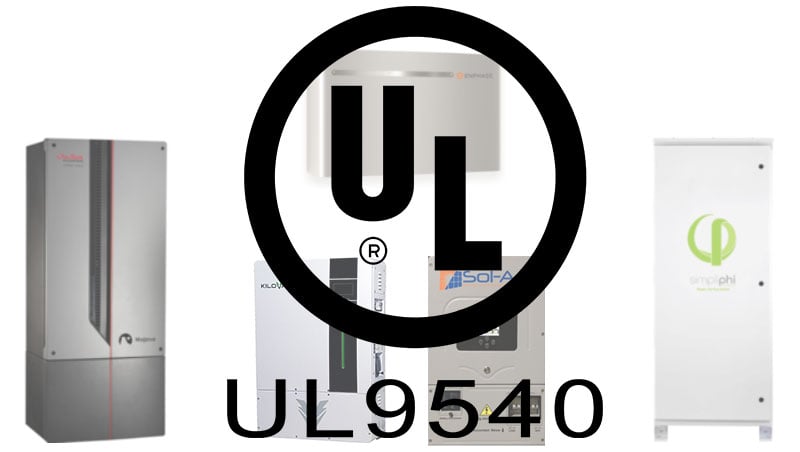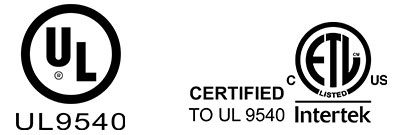
If you follow news about energy storage systems (ESS) or have been looking into a home battery backup system lately, you’ve probably come across the term “UL 9540”. But what is UL 9540 and how important is it to ensure your home energy storage system is certified to this level?
What is UL 9540?
UL 9540 is a safety standard for energy storage systems. For energy storage systems connected to a utility grid, the UL 9540 standard extends to the equipment used to make that connection. This standard pertains to fire and explosion safety concerns associated with ESS, including:
- The safety of the storage (battery) component during operation
- Fire detection
- Fire propagation and suppression
- Fire mitigation effectiveness in enclosed areas
Because an ESS includes multiple components, the UL 9540 standard actually encompasses two other, older standards: UL 1973 (for the stationary battery pack) and UL 1741 (for the inverter). These two individual standards – in conjunction with rigorous thermal and electrical testing and evaluation of the components working together as a system – comprise the UL 9540 certification.
What is the Difference Between UL 9540 and UL 9540A?
While UL 9540 is a set of standards an energy storage system must perform to, UL 9540A is a method of evaluating thermal runaway propagation in an ESS. So while UL 9540A is not a certification, it does provide important data for manufacturers seeking to get their ESS products certified to UL 9540 and for their engineers and product developers to verify the effectiveness of the product’s protection against critical hazards like fire.
There are four stages in the UL9540A test method:
- Cell testing – Cells are tested for flammability, whether they can exhibit thermal runaway, and the composition of gasses released.
- Module testing – Groups or “modules” of cells are tested for the ability of thermal runaway to propagate from one cell to others, as well as to outside the module.
- Unit testing – The potential of fire to spread from unit to unit is analyzed, as is the rate of heat release and the composition of gas to determine the potential for an explosion.
- Installation testing – The final stage tests unit to unit fire propagation in a closed room with fire mitigation equipment.
Is UL 9540 Certification Required for an ESS?
Certification of an energy storage system to UL 9540 is currently not required in most jurisdictions in the United States. However, the California building code has adopted International Residential Code (IRC), which requires UL 9540 for ESS. Massachusetts has also recently adopted the code. We expect it is likely that other cities and states across the country follow these states, and begin requiring it in the coming years.
Even if UL 9540 is not required where you live, restricting your energy storage system search to UL 9540 systems will bring benefits like:
- Peace of mind from knowing the system has been rigorously tested for safety
- Expediting project permitting and approval with a single UL stamp on the entire system
- Revealing which ESS manufacturers are taking safety seriously and planning for the future by earning UL 9540 certification now
Which ESS are Certified to UL 9540?
If you’re shopping for an ESS, don’t worry about UL 1973 and UL 1741 because as long as you see a “UL 9540” or “Certified to UL 9540” mark on an ESS ensures the system you plan to entrust you home power storage needs to is safe and designed to perform at a high level.
altE has made shopping for a safe, high-performance ESS easy with our selection of UL 9540 certified Energy Storage Systems from SimpliPhi, Sol-Ark, KiloVault, OutBack, Schneider, and Enphase.

